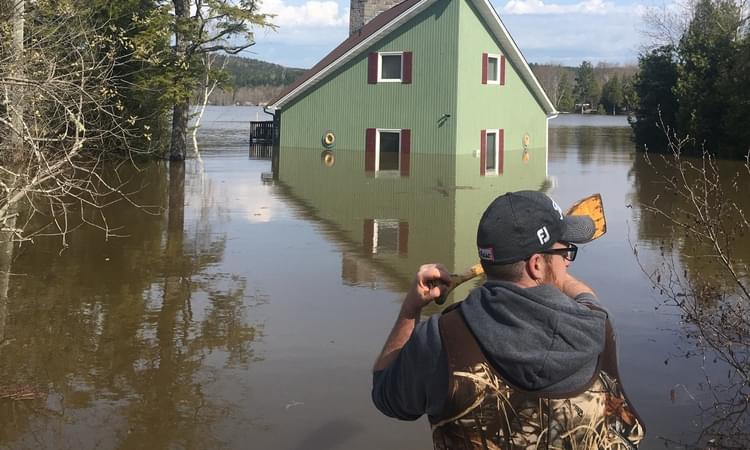Premier Urges Action to Avoid Future Floods – Telegraph Journal – 7 May 2018

The cottage of John and Sheila Fitzpatrick on Kennebecasis Island has fallen victim to the record-setting flood.
Here, John Fitzpatrick Jr. surveys the damage on Sunday.
Photo: Courtesy of John Fitzpatrick Sr.
“There’s a whole area of policy that needs to be developed to deal with these kind of extreme weather events and we haven’t got it. Hopefully, after this is all over and people are back in their homes, there will be a heightened sense of urgency on the part of the policy makers and cabinet to act on the long-term recommendations. But now’s not the time to focus on that.” – David Coon
Article by: JOHN CHILIBECK
FREDERICTON • Premier Brian Gallant says “we have to do everything we can” to avoid future floods.
And while he’s not blaming this season’s catastrophic snow melt and flooding on climate change, he says the frequency and severity of such disasters will only increase unless New Brunswick takes protective action.
During an emergency media briefing earlier this week with government officials, Gallant was asked whether the province should consider buying out people whose properties are in flood-prone areas and stop them from building anew in those same places.
“I don’t ever want to say that one isolated weather event is because of climate change,” the premier said. “The frequency and severity of weather events, we believe is, due to climate change.”
Flood waters continued to rise in several communities along the lower St. John River Sunday following more than a week of havoc.
Hundreds of homes and cottages were swamped in low-lying areas from Fredericton to Saint John. The worst-hit areas were under a voluntary evacuation order, a plea that was only heeded by a small number of people as scores tried to sandbag their properties.
Gallant said given that New Brunswickers can expect more flooding, coastal erosion and power outages in the future, the province had to do everything it could to reduce the dangers of global warming.
“We have to do a better job of mapping out where there are flood zones, the potential for flood zones in the future, where there will be erosion and what can be done to protect our coast and our communities because of rising weather events.”
New Brunswick’s climate change action plan, released in late 2016 by Gallant’s government, said it would take more than 100 steps, including providing the public better flood risk mapping, promoting the use of natural infrastructure as a buffer (such as forests, wetlands, salt marshes, floodplains) and working with organizations that deal with critical infrastructure, such as municipalities, NB Power and Aliant, to ensure they are resilient to bad weather events.
But some worry the changes are not happening quickly enough.
Louise Comeau, the director of the Environment and Sustainable Development Research Centre at the University of New Brunswick, said there remains public resistance and denial about the need to adapt to climate change.
“We need a social conversation on how we are going to keep communities safe,” she said. “At this point, I don’t think the public is fully understanding and fully supportive of the changes that are required.”
Comeau did not single out Gallant’s Liberal government for criticism. But she said it was important to move beyond simply reacting to emergencies.
“No government has done enough anywhere,” she said. “We all have work to do. Absolutely, progress has been made, but it’s been slow progress and we have to accelerate the pace.”
Progressive Conservative Opposition leader Blaine Higgs said with New Brunswick suffering more dramatic weather, he wanted to see what kind of measures were being taken after each disaster.
The ice storm of January and February of 2017 that knocked out power to hundreds of thousands of people and led to two deaths in the province’s northeast was followed by a government report with 51 recommendations.
“How many of those recommendations were dealt with and implemented? Because we need to learn from each one of these things. How do we improve our ability to respond?”
Green Party leader David Coon pointed to the legislature’s select committee on climate change, on which he served, whose final report came out in October 2016.
“There’s a whole area of policy that needs to be developed to deal with these kind of extreme weather events and we haven’t got it. Hopefully, after this is all over and people are back in their homes, there will be a heightened sense of urgency on the part of the policy makers and cabinet to act on the long-term recommendations. But now’s not the time to focus on that.”